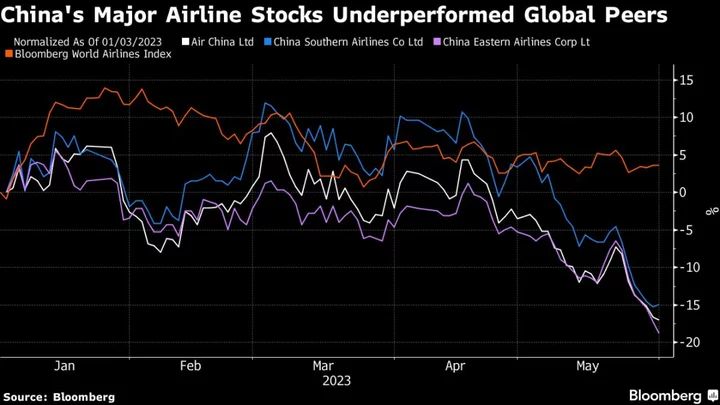The boom-and-bust in Chinese airline stocks is another sign that investors are losing patience with the country’s slow recovery months after it lifted Covid restrictions.
The country’s three largest carriers — China Southern Airlines Co. Ltd., Air China Ltd, and China Eastern Airlines Corp. Ltd. — went from being among the world’s top performing airline stocks in the fourth quarter to becoming the worst losers so far this year, according to data tracked by Bloomberg. The trio’s Hong Kong-listed shares have fallen more than 16% this year while a Bloomberg gauge tracking global airlines has gained 3%.
Investors are increasingly cautious on Chinese assets as the country struggles with a stalled economic recovery and tensions with the US. Lackluster international travel and losses at the nations’ biggest carriers will also continue to weigh on sentiment for the sector.
“Key concerns raised by investors now are the recovery trajectory of international travel,” said Jason Sum, an analyst at DBS Bank Ltd. Investors were “excessively bullish” and the first-quarter results, which came in below expectations, served as “a wake-up call.”
A key focus is how passenger yields — an indication of revenue — will be sustained given stiff competition in the market, he said.
READ: Global Money Is Chasing China Alternatives as Anxiety Grows
While China’s domestic air travel saw a strong rebound this year, recovery in the international segment came at a slower pace. The resumption of overseas flights on a weekly basis has stagnated at near 40% of the pre-pandemic 2019 level since the surge during the Labor Day holiday, according to Nomura International (Hong Kong) Ltd. The brokerage expects outbound travel to reach 70% by the end of this year.
Airline shares may still catch a breather in the near term. The Hong Kong-listed shares of these carriers entered oversold territory this week, signaling that the slide may have been excessive and a potential bounce could be in sight.
A weakening yuan will also be a headwind for the companies as they hold a sizable amount of dollar-denominated debt and rely on the greenback to purchase jet fuel and settle aircraft leasing payments.
The slump in airlines has outweighed even the decline in the Hang Seng China Enterprises Index, which slid over 7% this year. The gauge, which tracks Chinese companies listed in Hong Kong, recently entered bear market territory.
“Chinese carriers may be missing out on the current high-yielding international fare environment with the slower capacity recovery profile,” according to Tim Bacchus, a senior analyst at Bloomberg Intelligence.









